The Vitamins, Minerals, and Supplements (VMS) industry is undergoing significant transformation, fueled by changing consumer preferences, innovations in health and wellness, and the growing impact of social media trends. To help brands, retailers, and consumers navigate this dynamic landscape, we’ve analyzed the most recent State of the Industry report, highlighting the latest developments in key areas such as vitamins and supplements, sports nutrition, functional foods, and beverages, and the powerful influence of social media on consumer choices.
Navigating the Evolving Landscape of the VMS Industry
[PDF] State of the Industry: Vitamins & Supplements + Sports Nutrition 2024
Access the full reportVitamins & Supplements Overview
The vitamins and supplements market remains a cornerstone of the VMS industry, providing consumers with products that support overall health, longevity, and specific health conditions. The demand for holistic and fitness-oriented supplements continues to rise as consumers prioritize products that enhance physical performance, support muscle development, and provide natural, nutrient-dense options. According to recent data, the VMS total department saw a 3.7% increase in sales year-over-year, reflecting the growing consumer interest in maintaining and improving health through supplementation.
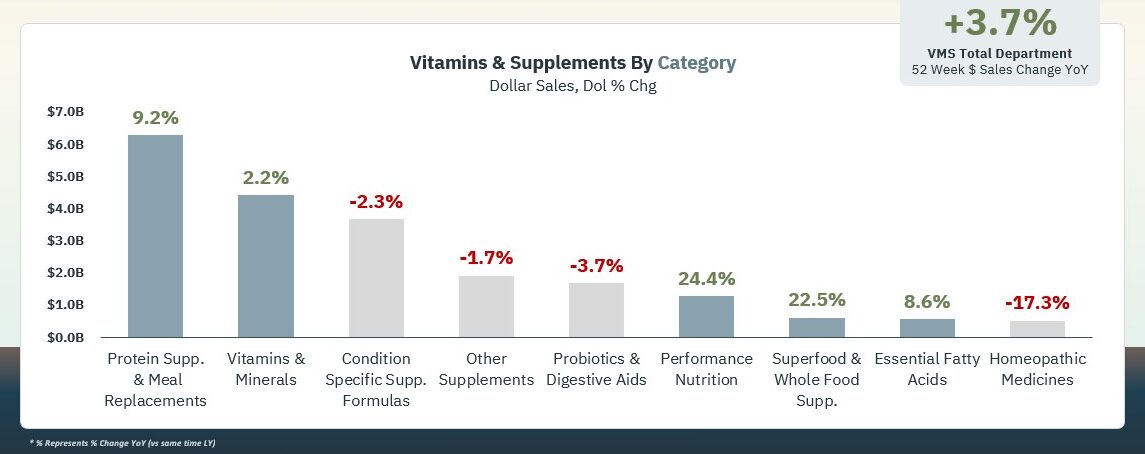
Source: SPINS Natural Channel + Multi-Outlet (MULO) (Powered by Circana); Dept: Vitamins & Supplements, 52 Weeks Ending 6/16/24
Condition-specific supplements have also seen a notable focus, particularly in areas such as cognitive health, calcium and bone support, reproductive health, and beauty. However, the growth in this segment has been mixed, with some categories experiencing declines, such as cognitive health supplements, which saw a 2.3% drop in sales. Despite these fluctuations, the overall trend indicates a strong consumer focus on preventive health and longevity, with shoppers increasingly investing in supplements that cater to their specific health needs.
The preference for different supplement forms is another key trend in this market. Softgels, capsules, powders, and vegetable capsules are favored for their enhanced absorption, customizable dosing, convenience, and suitability for various dietary restrictions. Notably, while some traditional forms like tablets have seen a decline, newer forms such as powders and vegetable capsules have gained popularity, reflecting a shift towards more modern, versatile supplementation methods.
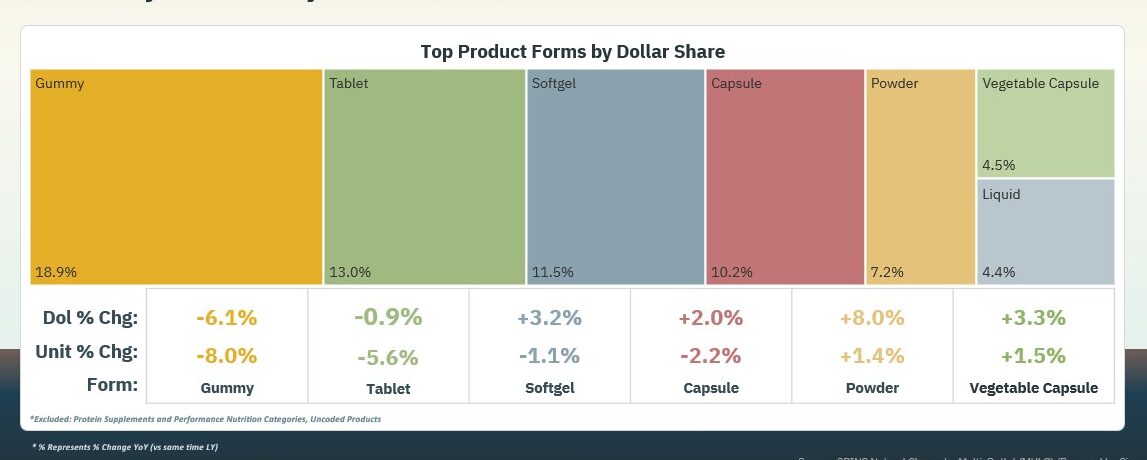
Source: SPINS Natural Channel + Multi-Outlet (MULO) (Powered by Circana); Dept: Vitamins & Supplements, Attribute: Forms, 52 Weeks Ending 6/16/24
Vitamins & Supplements Industry Trends
The VMS industry is not static; it continuously adapts to the changing needs and preferences of consumers. One of the most significant trends is the growing popularity of functional ingredients. These ingredients, which include everything from cardiovascular support to brain health, digestive aids, and energy boosters, are becoming increasingly sought after.
The industry has seen substantial growth in these areas, with specific ingredients like magnesium, Vitamin K, and folic acid leading the charge. Magnesium, in particular, has become a “holy grail” supplement due to its wide range of benefits, including sleep aid, mood improvement, and blood sugar regulation.
The steady growth in multivitamins, minerals, and vitamins B, A, D, and K further illustrates the industry’s focus on long-term health and wellness. Consumers are increasingly looking for products that provide comprehensive support for immune function, vision, heart, muscle, and bone health, contributing to a 2.2% increase in sales within the vitamins and minerals category.
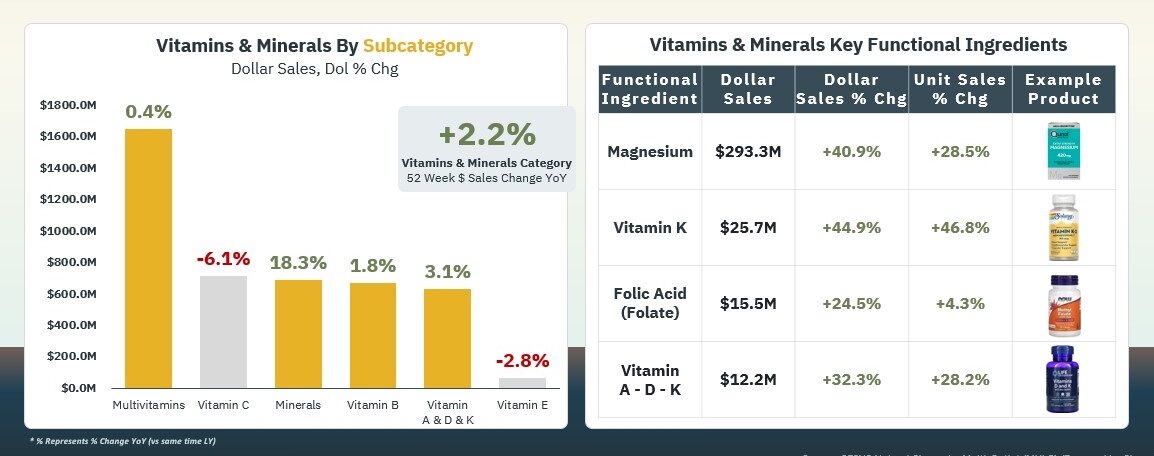
Source: SPINS Natural Channel + Multi-Outlet (MULO) (Powered by Circana); Dept: Vitamins & Supplements, Category: Vitamins & Minerals, 52 Weeks Ending 6/16/24
In terms of specific health concerns, probiotics continue to play a crucial role in consumers’ supplement routines, despite a slight decline in sales. Probiotics remain a staple for optimizing gut health, with various forms such as capsules, gummies, liquids, and powders being popular choices. The women’s health segment is another area of interest, with strong growth in supplements that address beauty, mood support, premenstrual syndrome, and weight loss. Despite an overall market decline, these areas have shown resilience, reflecting the ongoing demand for targeted health solutions for women.
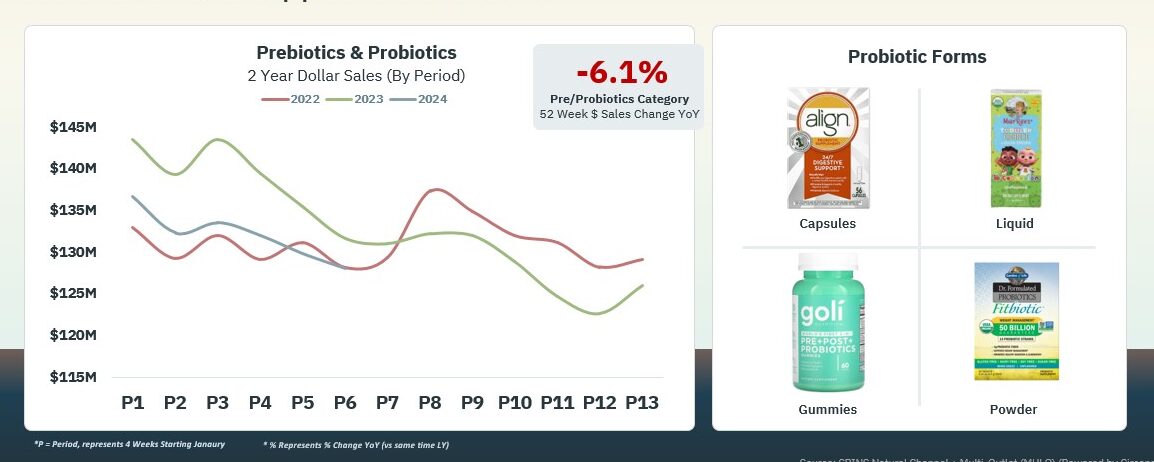
Source: SPINS Natural Channel + Multi-Outlet (MULO) (Powered by Circana); Dept: Vitamins & Supplements, Category: Prebiotics & Probiotics, 3 Years Ending 6/16/24
Sports Nutrition Industry Trends
Sports nutrition is another vital component of the VMS industry, catering to consumers who prioritize physical performance and recovery. The demand for products that enhance athletic performance through proper hydration, targeted supplements, and essential micronutrients has grown significantly. Performance nutrition, in particular, has seen a 24.4% increase in sales, driven by the rising popularity of hydration and electrolyte supplements, creatine, and intra and post-workout products.
Hydration products have become essential for a wide range of consumers, not just athletes. The market for these products, which include sports drinks, electrolyte powders, and enhanced waters, has expanded significantly, with sales growing by over 50% in recent years. This growth is partly due to the increasing awareness of the importance of hydration for overall wellness, making these products popular among casual athletes, concertgoers, and travelers alike.
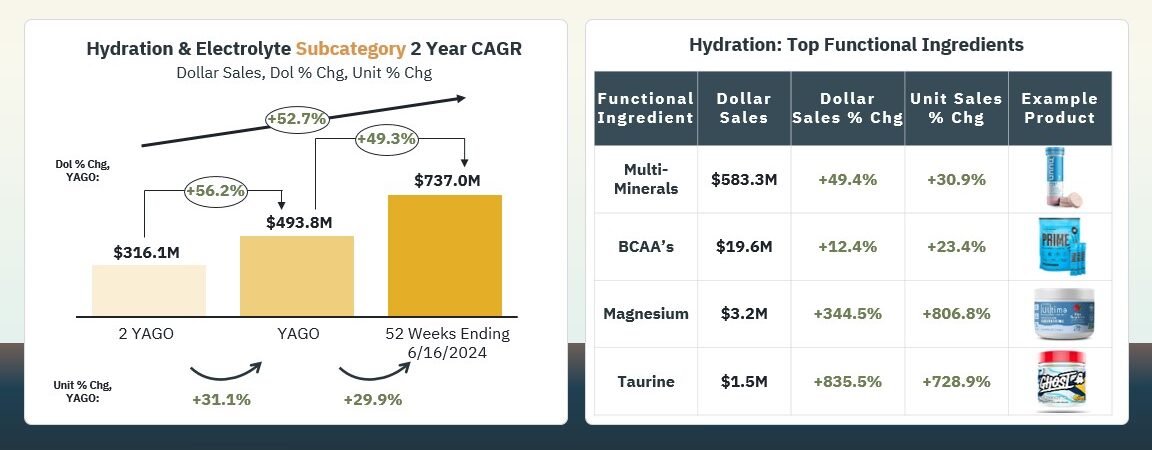
Source: SPINS Natural Channel + Multi-Outlet (MULO) (Powered by Circana); Dept: Vitamins & Supplements, Subcategory: Hydration & Electrolytes, 3 Years Ending 6/16/24
Pre-workout supplements are also undergoing a transformation as consumers seek alternatives to traditional stimulants. There is a growing preference for natural, multifunctional pre-workout blends that enhance focus, muscle recovery, and endurance without the side effects commonly associated with high-caffeine products. This shift towards natural and organic options reflects a broader trend in the VMS industry, where consumers are increasingly concerned about the ingredients they consume.
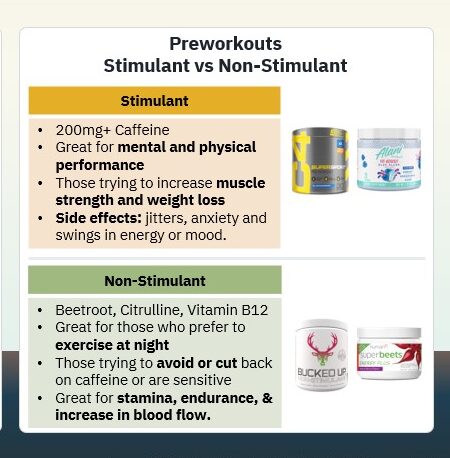
Dept: Vitamins & Supplements, Category: Performance Nutrition, Subcategory: Preworkout, 3 Years Ending 6/16/24
Food & Beverage Industry Trends
The intersection of the VMS and food and beverage industries is creating new opportunities for innovation. Functional beverages, which are enhanced with ingredients that provide various health benefits, are becoming increasingly popular. These drinks, which can improve digestion, boost energy, support mood and sleep, and enhance immune function, are gaining traction among health-conscious consumers.
The trend of incorporating protein into a variety of foods and beverages is also on the rise. Protein supplements and meal replacements are no longer limited to powders and shakes; they are now found in pastries, snacks, chips, and cereals, making it easier for consumers to incorporate protein into their diets throughout the day. This shift has been fueled by the growing interest in weight management, post-workout recovery, and the desire for new and exciting flavors.
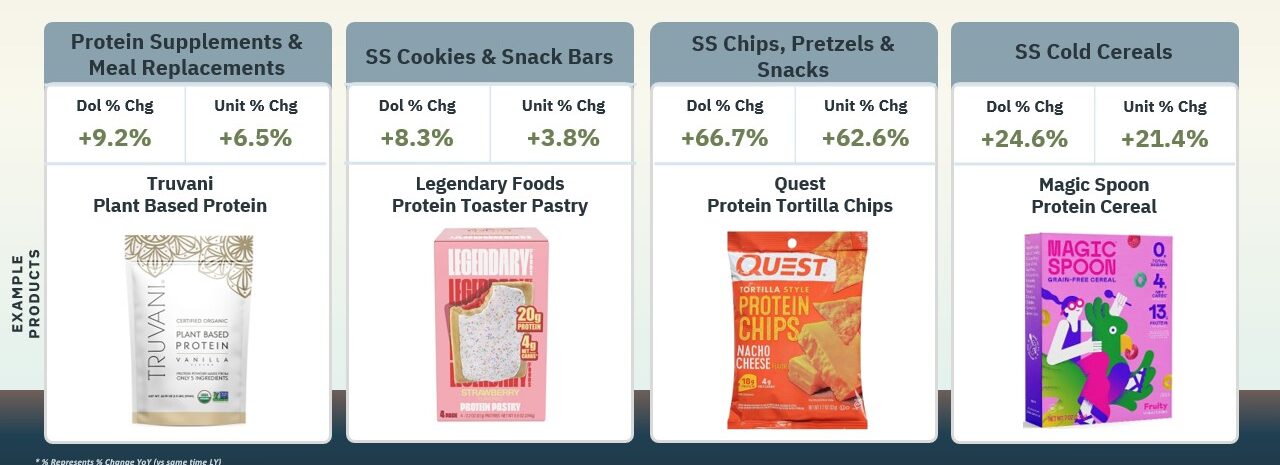
Source: SPINS Natural Channel + Multi-Outlet (MULO) (Powered by Circana); Dept: Vitamins & Supplements, Grocery, Attribute: Functional Ingredients: Protein Included, 52 Weeks Ending 6/16/24
Furthermore, the demand for functional ingredients in weight loss products is seeing renewed interest. Ingredients such as apple cider vinegar, MCTs, collagen, and barberry are being incorporated into supplements that offer both weight loss and other health benefits. This holistic approach to weight management reflects a broader trend toward products that provide multiple benefits, appealing to consumers who are looking for more than just weight loss.
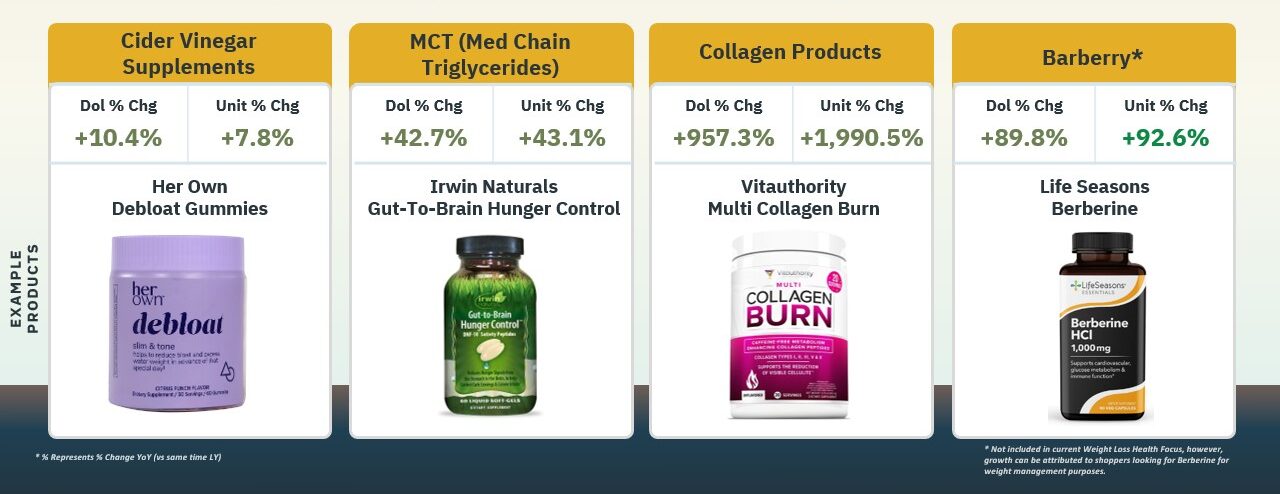
Source: SPINS Natural Channel + Multi-Outlet (MULO) (Powered by Circana); Dept: Vitamins & Supplements, Attribute: Health Focus: Weight Loss, 52 Weeks Ending 6/16/24
Emerging Trends on Social Media: What’s New and What’s Next?
Social media platforms like TikTok have become powerful drivers of trends in the VMS industry. High-protein diets, hydration, creatine, magnesium, and gut health are among the leading topics discussed on these platforms. The viral nature of social media trends means that products can quickly gain popularity and drive sales in the VMS market.
One of the most significant trends on social media is the focus on natural and plant-based products. Lions Mane Mushroom supplements, postbiotics, plant-based proteins, and CBD/CBG gummies are among the trending topics that are shaping consumer preferences. These products are often promoted for their health benefits, such as cognitive function, immune support, and stress relief, resonating with the growing consumer interest in holistic wellness.
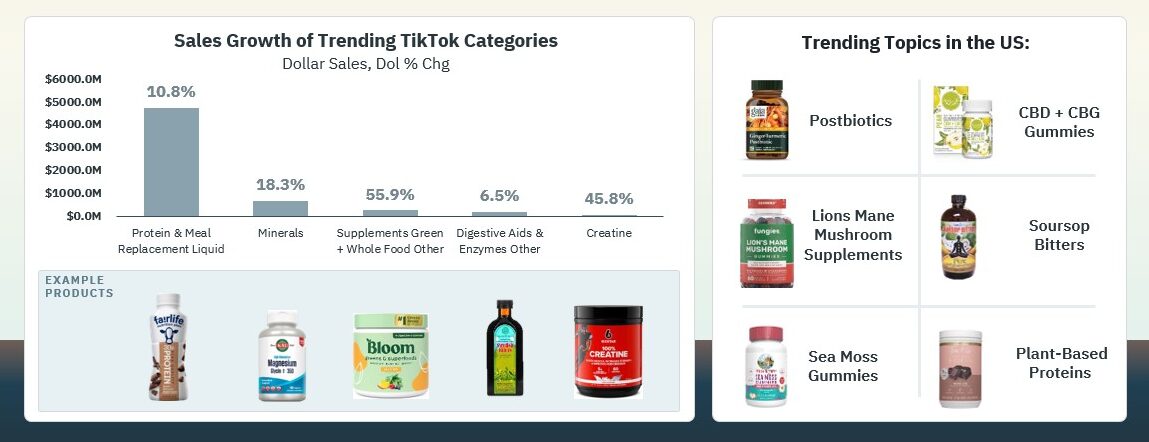
Source: SPINS Natural Channel + Multi-Outlet (MULO) (Powered by Circana); Dept: Vitamins & Supplements, 52 Weeks Ending 6/16/24
The impact of social media on the VMS industry cannot be overstated. As consumers increasingly turn to platforms like TikTok for health and wellness advice, brands must stay attuned to these trends to remain relevant. The rapid dissemination of information on social media means that brands must be agile and responsive, ready to adapt to new trends as they emerge.
Embracing the Future of Health & Wellness
The future of the VMS industry lies in its ability to adapt to changing consumer demands and the integration of new technologies and trends. As consumers become more informed and health-conscious, the industry must continue to innovate, offering products that meet their evolving needs.
Personalization is likely to play a significant role in the future of the VMS industry. As consumers seek products tailored to their specific health goals, brands that can offer personalized solutions will have a competitive edge. This trend towards personalization is already evident in the rise of customized supplement packs and digital platforms that provide personalized health advice based on individual needs.
Sustainability is another critical area of focus for the future. As consumers become more environmentally conscious, there is increasing demand for products that are not only effective but also sustainable. Brands that prioritize eco-friendly packaging, sourcing, and production methods will likely resonate with this growing consumer segment.
In conclusion, the VMS industry is at a crossroads, with numerous opportunities for growth and innovation. By staying ahead of emerging trends, embracing personalization, and prioritizing sustainability, the industry can continue to thrive in the evolving landscape of health and wellness.
Sign-up for our monthly "What's Supp?" newsletter to receive the latest happenings across the category in your inbox.
Sign-upCONTENT
Navigating the Evolving Landscape of the VMS Industry
Vitamins & Supplements Overview
Vitamins & Supplements Industry Trends
Sports Nutrition Industry Trends
Food & Beverage Industry Trends
Emerging Trends on Social Media: What’s New and What’s Next?
Embracing the Future of Health & Wellness








